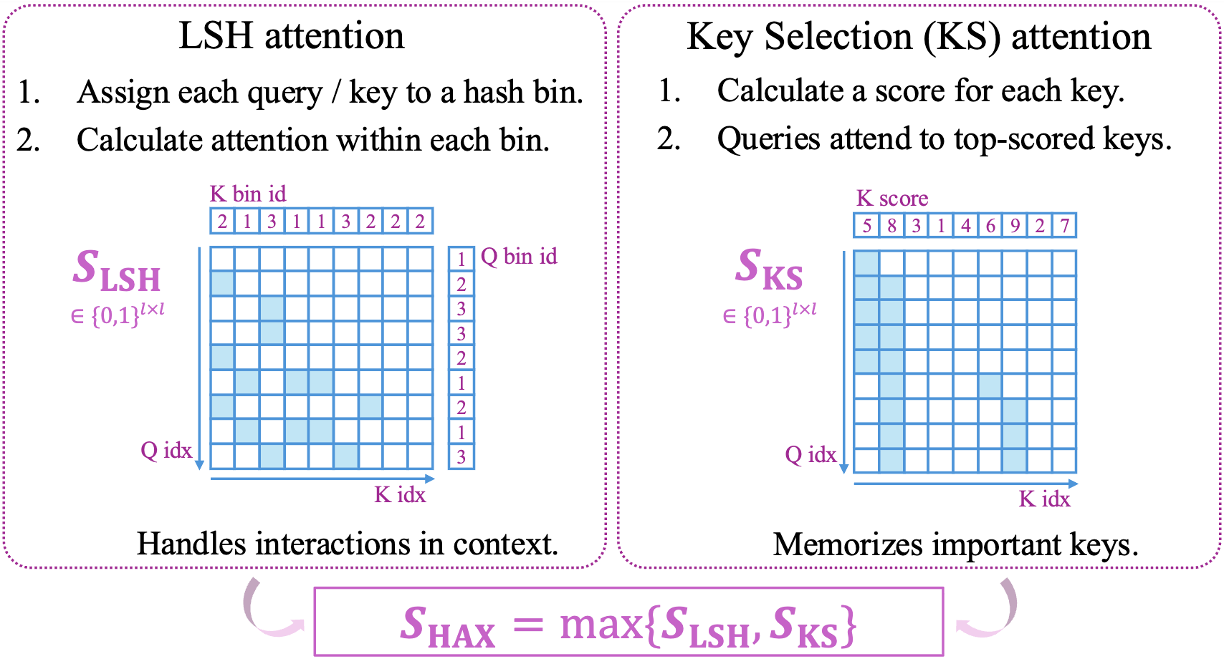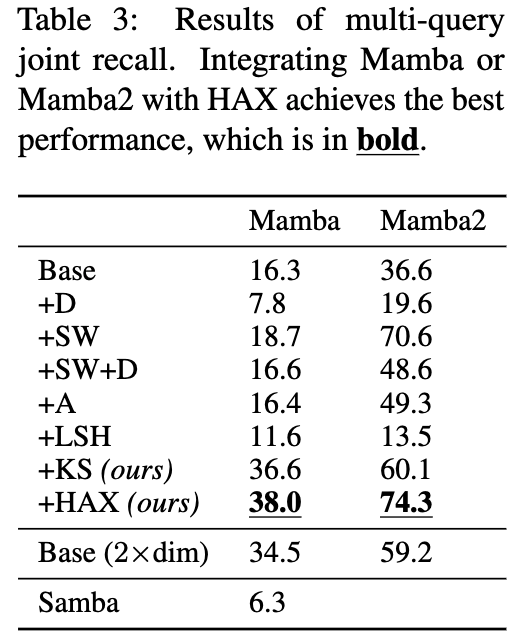This is the official codebase of the paper Overcoming Long-Context Limitations of State-Space Models via Context-Dependent Sparse Attention.
We introduce joint recall, a novel synthetic task that extends associative recall to context-dependent key-value association, which offers a new perspective for both theoretical analysis and empirical benchmark for long-context modeling.
Guided by the theoretical analysis on joint recall, we propose a novel architecture, HAX, based on state-space models (SSMs) integrated with context-dependent sparse attention (CDSA), which consistently outperforms SSMs and SSMs integrated with context-independent sparse attention (CISA) on both synthetic and real-world long-context benchmarks.
HAX stands for locality-sensitive Hashing Attention with sparse Key Selection, combining LSH and key selection (KS) attention patterns. Both LSH and KS attention are context-dependent and serve as complementary mechanisms: LSH enables flexible, content-based interactions by routing queries to similar keys, while KS provides global focus by attending to a few important positions. We further integrate SSMs with HAX, as shown in the following figure, thereby addressing the theoretical expressiveness bottleneck of SSMs as analyzed on the joint recall task.
Finally, we would like to note that our joint recall task is not designed specifically for SSM optimization, but could serve as a general-purpose tool for long-context modeling studies.
Please use the following versions of Python packages:
python==3.12.9
torch==2.6.0
transformers==4.49.0
datasets==3.4.0
triton==3.2.0
flash_attn==2.7.4.post1
mamba-ssm==2.2.4
causal-conv1d==1.5.0.post8
flash-linear-attention==0.2.0
Our implementation is based on Flash-Linear-Attention
To reproduce the synthetic experiments from the paper, please run:
python scripts/joint_recall.py \
--base_arch [specify_base_arch] \
--sparse_arch [specify_sparse_arch] \
--data_dir [path_to_dataset_cache] \
--save_dir [path_to_save_model]
Options for --base_arch:
- Mamba
- Mamba2
- Samba
Options for --sparse_arch:
- None (base SSM architectures that do not include the sparse attention module)
- dilated (+D)
- sliding_window (+SW)
- sliding_window+dilated (+SW+D)
- sliding_window+sink (+A)
- sign_bin_lsh (+LSH)
- key_selection (+KS)
- sign_bin_lsh+key_selection (+HAX)
For example, to run experiments with the base Mamba SSM, use:
python scripts/joint_recall.py --base_arch mamba
To run experiments with Mamba2 integrated with HAX, use:
python scripts/joint_recall.py --base_arch mamba2 --sparse_arch sign_bin_lsh+key_selection
To reproduce the synthetic data generation described in the paper, please run:
python scripts/create_dataset.py --data_dir [path_to_dataset_cache]
By default, this script generates the joint recall dataset used in the paper, including 1.4M training samples, 14.4K validation samples, and 14.4K test samples.
Below is the joint recall experiment result reported in our paper:
If you find this codebase useful, please cite:
@inproceedings{zhan2025overcoming,
title={Overcoming Long-Context Limitations of State-Space Models via Context-Dependent Sparse Attention},
author={Zhan, Zhihao and Zhao, Jianan and Zhu, Zhaocheng and Tang, Jian},
booktitle={The Thirty-ninth Annual Conference on Neural Information Processing Systems},
year={2025}
}



